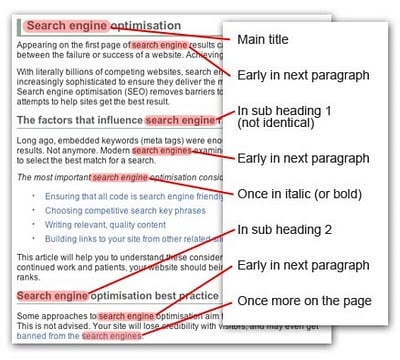After selecting a series of keywords that your potential customer will use to find your website, you need to focus on those keywords  as part of your web page content. If you have several keywords, you may want to have a web page that focuses specifically on that keyword. For example, let's say your keywords are:
as part of your web page content. If you have several keywords, you may want to have a web page that focuses specifically on that keyword. For example, let's say your keywords are:
- meditation tool
- habit control
- focusing tool
- relaxation
- learn to meditate
- how to meditate
- meditation supplies
By focusing on each of these words with a page that corresponds to
the keyword phrase and hitting an appropriate keyword density ratio - somewhere between 3% and 7% is often considered a good range - you assist the search engines in finding your page for those keywords. However, if you exceed the keyword density by too much, the search engines will probably consider your site to be artificially stuffed and penalize your website. So you need to watch carefully how your keywords are dispersed. It is not just the keyword density that is important but also the placement and usage of those keywords. It is important that your keywords appear in the following locations:
- Page title
- Meta tags
- Very early in the website in a <H1> heading tag
- Within the first 10 to 20 words of the first paragraph
- Bolded within the body content
- Alt tags on your images
If you find your competitors' website consistently placing higher than your website on a search for your keywords, it is likely that your website is not utilizing these keyword positioning tactics. Remember that in Lesson #1, we emphasized that it is all about keywords. Keywords are the crumbs that lead your customers to your website. Those crumbs have to be well-placed on your web pages so that the search engines can create the trail to your website for your potential customers. The only reason the search engines will create that trail to your website is if your web design illustrates to the search engines that you are an authority for that keyword phrase. More about creating authority in Lesson #3.
Your assignment this week is to review your website for keyword placement to see if you can improve the way your content is displayed. Look for your keywords on each page and determine whether you are trying to place too many keywords on one page thereby diluting the keyword density. If that is the case, consider breaking your content into separate pages that will be more easily found by the search engines.
Reprinted with permission.
Copyright © 2012 TAO Consultants, Inc. All rights reserved.


